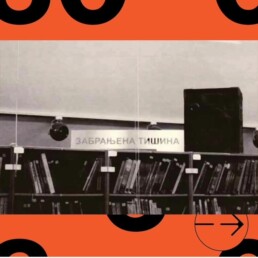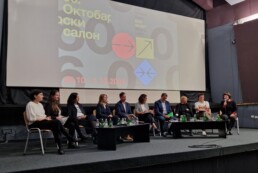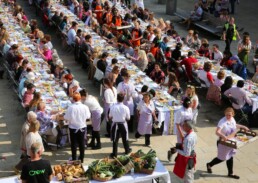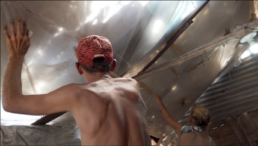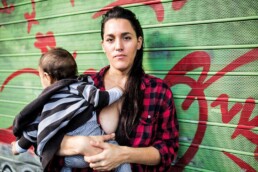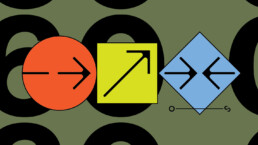DREAM CLUB ▪︎ Radio-station and Club ▪︎ Ex Club Akademija
⪢ A radio project for @oktobarski_salon for 6 weeks broadcasting from historical Klub Akademija, a stronghold for Belgrade’s underground culture along the 80’/90’s/2000’s
⪢ Contributions, radioshows, live performances and talks will be aired in streaming and via FM, and everyday from 1pm to 6pm public can access the club as a listening space or to assist live to concerts and shows.
⪢ We’ll have any sort of guests from musicians and journalists from that time to organizers and performers active now internationally, students, artists and more!
⪢ Follow program and contributors and tune in at www.spettro.info/dreamklub or at 98.2Mhz if in town!
Oct 19 – Dream Klub Project launch: live show w/ Bane Jovancevic and Francesco Fonassi from 5PM to 8PM.
Oct 20 – Live showcase w/ Estades (ES), Vacas (ES), Poseidonia (IT) and Devid Ciampalini (IT) from 1PM to 6PM
Oct 21 – Akademija Legacy Revisited, radioshow and conversation moderated by Toma Grujic w/ Uros Djuric, Dobrila Denegri and Biljana Tomic about Klub Akademija history and Miomir Grujić Fleka’s Radio Šišmiš, 2pm to 6pm.
Oct 22 – Dream Klub One-Day Radio Festival w/ Incompetence Records.Curated by Inturist (RUS) from 1PM to 6PM (artists TBA).
Oct 23 – Dream Klub One-Day Radio Festival. Curated by Bane Jovancevic from 1PM to 6 PM (artists TBA).
Oct 24 – Live showcase w/ Canedicoda (IT), Massimo Carozzi (IT), Laura Angeles (ES), Spettro Crew (IT), KNN (IT), from 1PM to 6PM.+Meeting from the Klub with the Fine Arts Academy professors Nemanja Nikolic and Lidija Delic’s students.
Oct 25 – Dream Klub Archive: Rex Ilusivii (Mitar Subotić – SUBA) special show from 1PM to 6PM.
+Loophole Magazine: focus and live conversations w/ selected Octobber Salon artists
+ Every day music selections, tape and electronics impros and intermezzo live from the Klub by Francesco Fonassi and Flavia Spasari
SELECTION FROM THE PROGRAM OF THE 60TH OCTOBER SALON
All exhibition spaces of the 60th October Salon open on Sunday, October 20, at 1 p.m., and during the six weeks of the event, the public can expect numerous exhibitions and programs in which more than forty domestic and foreign artists participate.
During the more than one month duration of the 60th October Salon, from October 20 to December 1, at nine locations and in public spaces in the city, numerous programs will take place in various formats: readings, talks, discussions, workshops, performances and lectures.
As announced at the press conference held on Friday, October 18, in the Cultural Center of Belgrade, the entrance to all exhibitions and programs is free, and this year's locations are: three galleries of the Cultural Center of Belgrade (Art Gallery, Artget Gallery and Podroom Gallery), Pavilion in Cvetni trg, FLU Gallery, former Akademija Club, ULUS Gallery, SULUJ Gallery, Salon of the City of Belgrade Museum, the Museum of African Art, the windows of the French Institute and public spaces in the city.
The performance 7x70 – Meal by authors Lucy and Jorge Orta was organized before the official opening of the event, on Friday, October 18, in front of the Cultural Center of Belgrade. Lunch in a public space for 200 guests, in the public space, brought together some of the figures on the public, political and cultural scene of Belgrade, with the idea that "sitting at the same table, sharing bread and food" can be a way of drawing attention to some of the burning issues faced by artists and cultural workers in our country. This work is a part of the curatorial concept Trace, which through sends a message about the necessity of providing spaces where artists can create, and which are important for the stimulation and development of the artistic and cultural scene. In addition to this concept, the October Salon consists of two more parallel lines: Aesthetic(s) of Encounter(s) examines what results from the exchange of foreign and domestic authors, sharing and association, while the concept Hope is a discipline focuses on our experience of work, on the
uselessness of work and on the connection between work and art .
The puppet show by Daniela Ortiz, an artist from Peru, which will be presented for the first time in front of the Cvijeta Zuzorić Pavilion on the opening day, Sunday, October 20, tells in an allegorical way about the necessity of the fight for free speech and the necessity for art to be critical of the economic, political and social imperatives of liberal capitalism.
"Where are our spaces for work?" is a question that the citizens of Belgrade have the opportunity to see on billboards during the manifestation. It is about the work of Nina Ivanović, which shows the BIGZ and Jugošped buildings, spaces whose repurposing means the departure of artists from them. On this occasion, on October 23, artists will organize a participatory performance on Cvetni trg, which will draw attention to this topic.
The members of the local collective Karavan are inspired by the memorabilia they find in the Roma settlement of Bair, where the Karavan creates murals on the walls of the family houses of musicians, with the recommendations and suggestions of Bair residents. Art duo dopelgenger's Recording of a termite landscape is an essay in which the authors look at images of the past of miners in a socialist society, comparing them to the hidden image of mining in a capitalist society.
The video work The Value of Absence by Adrian Melis talks about distrust towards Cuba's socialist economic model, where public servants invented excuses to miss work due to low wages. Melis decides to pay for these excuses by giving the people producing the video work exactly the amount of money their absence from work is worth.
Kiluanzhi Kia Henda, an artist from Luanda, will show a film about political and social problems in the contemporary art scene of Luanda in the Cultural Center of Belgrade Cinema Hall (DKC), and the artist Mwana from Angola will present the performance A ritual of sisterhood in the Museum of African Art.
Alfredo Haar, painter, artist and architect, is also a guest of Belgrade. Hewill hold a public lecture Things are falling apart at DKC.
The programme will also include several workshops for children, in the Cultural Center of Belgrade Cinema Hall and in the Museum of African Art.
⫸ Detailed program: https://oktobarskisalon.org/program/
-------------------------------------------------- -------------
7x70 - Meal, Lucy + Jorge Orta
The performance 7×70 - Meal, created by Lucy and Jorge Orta, was organised before the official opening of the 60th October Salon on Friday, October 18, at 2:00 p.m., in front of the Cultural Centre of Belgrade. Lunch for 200 guests brought together some of the figures of the public, political and cultural scene of Belgrade, with the idea that "sitting at the same table, sharing bread and food" can be a way of drawing attention to some of the main issues faced by artists and cultural workers in our country.
The lunch in Belgrade is the 47th meal that Lucy and Jorge Orta have organized in public spaces of various cities around the world.
“The Starving Bureaucrat” ▪︎ Adrian Melis and Đeji Hadrović ▪︎ Opening of the 60th October Salon
In his work, Melis addresses issues like labor conditions, inefficiency, and unproductivity from a sociopolitical and artistic perspective. In most cases, he uses his own work to create a platform for others to express, in an ironic, absurd, and humorous way, their concerns about the relationship between art and labour.
Within the “Hope is a Discipline” concept, Melis presents this work in collaboration with Slovenian artist Đejmi Hadrović, addressing what they called “a performance within a performance.” The work is based on the topic of unpaid artistic labor in the political and economic system of contemporary capitalist societies.
In “The Starving Bureaucrat” Melis’s invisible performance consists of inviting Dejmi Hadrovic, a Slovenian artist and colleague to take part with him in the festival. Following the communication with the curatorial team, they both succeeded in making the festival pay for all things any artist deserves, traveling, accommodation, artist fee and per diem, and even the possibility of presenting her work by using Melis’s place. During the performance, Melis won’t be an active part of it, instead, Đejmi will present her own personal approach to the topic of “starving artists” by addressing the relationship between artists and institutions in a capitalist society such as unpaid work, invisible and side jobs to survive the lack of opportunities.
———————————————-
Adrian Melis Sosa (Havana, Cuba, 1985) is a multidisciplinary artist, based in Cuba and Europe. Between 2005 and 2010, Melis studied at the University of Arts in Havana. He is a former resident of the Rijksakademie van Beeldende Kunsten of Amsterdam (2014/2015). He is currently teaching at Berlin Art Institute. He has exhibited in several museums and institutions including, among others, Kunsthalle Basel, Basel; Museum of Modern Art, Warsaw; Wiels, Brussels; Centre Pompidou, Paris; Pinchuk Art Center, Kyiv; Pori Art Museum, Pori; De Appel Center, Amsterdam; Queens Museum, New York, and the 10th Shanghai Biennial. Since 2010 he is represented by ADN Galería, Barcelona, where his solo exhibitions in 2012 and 2013 were awarded the “Art Nou” Award by the Association of Galleries Barcelona and the GAC award (MACBA) for Best Exhibition in a Private Gallery, respectively. In the year 2023 Melis was granted the CIFO awards for latinoamerican artists. His work is in private and public collections, including LENTOS Museum, Linz; Pori Art Museum, Finland; MAS Santander, Spain; MACBA Barcelona; Fundación Cerezales Antonino y Cinia, Spain; Collection Alain Servais, Belgium; Collection Lemaître; Collection A. de Galbert, France and Collection Teixeira de Freitas, Portugal.
THE PUPPET SHOW BY DANIELA ORTIZ ▪︎ OPENING OF THE 60th OCTOBER SALON
Луткарска представа Даниеле Ортиз, уметнице из Перуа, која ће бити представљена премијерно на тргу испред павиљона Цвијете Зузорић на дан отварања, у недељу, 20. октобра, у 13 часова, на алегоричан начин прича о неопходности борбе за слободну реч, израз, поглед на свет и живот уметности која се критички односи према економским, политичким и друштвеним императивима либералног капитализма.
————-
Данијела Ортиз (Перу, 1985) живи и ради у Урубамби. У свом раду, ствара визуелне наративе у којима се истражују концепти националности, рацијализације, друштвене класе и жанра, како би се критички разумеле структуре колонијалне, патријархалне и капиталистичке моћи. Њени новији пројекти и истраживања баве се системом контроле миграција у Европи, његовом повезаношћу са колонијализмом и правним структурама које институције стварају како би починиле насиље над расизованим заједницама у знак одмазде због њиховог отпора. Откако се вратила у Перу, уметница се у својим радовима бави интернационалном солидарношћу и бригом, борбама против екстрактивизма као и револуционарним процесима у којима устаје у одбрану приступа земљишту. Такође се у својим пројектима бавила и перуанском вишом класом и њеним израбљивачким односом према домаћим радницима. У последње време се у свом раду вратила ликовности и ручном раду, те производи уметност користећи се медијима керамике, сликања, израде лутака и колажа, као и форматима као што су књиге за децу, како би учинила отклон од евроцентричне естетике концептуалне уметности.
Поред бављења уметношћу, Данијела Ортиз је и мајка троје деце, држи предавања, радионице и учествује у различитим дискусијама и борбама против европског система за контролу миграција, империјализма, институционалног расизма и јудицијализације мајчинства.
Међу скорашњим самосталним изложбама издвајају се: Tiro al blanco, Arte Fiera 2024, Болоња (2024); Die Kinder der Kommunisten II, Kunstverein Wiesbaden, Висбаден (2023); I figli dei Comunisti I, Laveronica, Модика (2023); La Rebelión de las Raíces, àngels barcelona, Барселона (2023) и Take my blood and write on the soil, the people must know that we are being taken prisoners. An anti-colonial bow to the Cromotex Union, Theater Neumarkt, Цирих (2023). Међу скорашњим групним изложбама издвајају се: The Disobedience Archive, 60. Бијенале у Венецији (2024); True Colors, Уметничка фондација AkzoNobel у оквиру Kunstmuseum у Хагу (2024); Anti-Futurismo Cimarrón, La Virreina Centre de la Imatge, Барселона (2024); Looking a-way: Othering in/of the (semi)periphery, tranzit, Словачка (2024); A Model, Mudam Луксембург, Луксембург (2024); GUT_BRAIN 1. Destructive Desires and Other Destinies of Excess, Галерија Блеквуд, Торонто (2024) и Preludio. Intención poética, Колекција MACBA, MACBA, Барселона (2024).
OPENING OF THE 60TH OCTOBER SALON
All exhibition spaces that will be open to the public from October 20 at 1 p.m. are:
☆ galleries of the Cultural Center of Belgrade (Likovna galerija, Podroom Gallery, Artget Gallery)
☆ Pavilion in Cvetni Trg
☆ Gallery of the Faculty of Fine Arts (FLU)
☆ former club Academy
☆ Gallery of the Association of Fine Artists of Serbia (ULUS)
☆ Gallery of the Association of Fine Artists of Yugoslavia (SULUJ)
☆ Salon of the Museum of the City of Belgrade
☆ Museum of African Art
☆showcases of the French Institute
☆ public spaces in the city
ADDRESSES OF EXHIBITION SPACE AND WORKING HOURS
————————————–
OPENING PROGRAM
⫸ 13.00 • Plateau in front of the “Cvijeta Zuzorić” Art Pavilion, 1 Mali Kalemegdan
Daniela Ortiz, The root you pulled out is not a hole in my land; it is a tunnel • Puppet show
⫸ 14.00 • FLU Gallery, 53 Knez Mihailova St.
Kathrin Bὄhm and Jelena Micić, Penfold Principles meets EU Regulation 2024/1252 • Workshop/talk
Join Kathrin and Jelena for an informal conversation and work-in-progress
editing session to add to their narrative intervention in the gallery. “Extraction” and “Interdependence” are some of trigger words that emerge from their collaborative overlapping of two texts: The Penfold Principles and the EU Critical Raw Material
⫸ 16.00 • Salon of the Belgrade City Museum, 30 King Alexander Blvd
Guided tour through the exhibition • Curators: Matthieu Lelièvre and Maja Kolarić
⫸ 18.00 • Museum of African Art, 14 Andre Nikolića St.
Opening ceremony
Adrian Melis Sosa and Đejmi Hadrović, The Starving Bureaucrat • Performance
CRITICAL ISSUES OF TODAY AT THE 60TH OCTOBER SALON
Spaces for art and artists, new perspective on work and jobs at the present moment, dialogue between participants on the artistic and cultural scene, the less visible artists, social and climate changes; these are some of the topics that are present in works and performances which will be presented at this year’s edition of the October Salon.
During this year’s 60th edition of the October Salon, from October 20 to December 1, exhibitions and accompanying programs will take place, as usual, in several locations – the galleries of the Cultural Center of Belgrade, the Pavilion in Cvetni trg, the Gallery of the Faculty of Fine Arts (FLU), the former Akademija club, the Gallery of the Association of Fine Artists of Serbia (ULUS), the Gallery of the Union of Fine Artists of Yugoslavia (SULUJ), Salon of the Museum of the City of Belgrade, Museum of African Art, windows of the French Institute and public spaces in the city.
We spoke with curators Dobrila Denegri, Maja Kolaric, Ana Knezevic and Emilia Epstajn about cooperation with foreign curators and about art works which they would like to highlight within the three concepts that are the pillars of this year’s edition of the Salon.
On Friday, October 18, before the official opening of the October Salon, the artistic duo of Lucy and Jorge Orta will introduce us to the program and themes through a performance in front of the Cultural Center of Belgrade. This work should be an invitation to dialogue between artists, the city’s cultural scene and the structures that determine cultural policy at the local and state level. As Dobrila Denegri, art historian and curator, who worked on the Trace concept with Lorenzo Balbi, director of the Museum of Modern Art in Bologna – MAMbo, explains, these artists have been affirmed since the mid-90s with their engaged approach that problematizes the critical issues of today: climate change , danger of droughts, migration, and processes of social integration, coexistence and equality. “We decided to present the 47th version of their collective performative act, entitled 7×70 – Meal, as a form of a peaceful protest, with the idea that ‘sitting at the same table, sharing bread and food’ can be a way of drawing attention to some of the burning problems faced by artists and cultural workers in our country.”
Lorenzo’s concept for the Trace segment is based on the proposal to invest the entire budget of the manifestation in the purchase of a building that would be used as an exhibition space for the October Salon, which never had its own space. Such a facility would remain available for artists and art even after the event. However, the October Salon takes place, like years before, in several locations, so the concept was transformed. “Almost all the interventions that we have included in our October Salon segment have a similar message: it is necessary to create spaces where artists can create, and which can become humus for a more prosperous artistic and cultural scene. We want to illustrate that message through a series of examples, mainly actions, performances, workshops of foreign and domestic artists who deal with an endemic problem in every context affected by the processes of gentrification, market liberalization and, in general, the reduction of sensibility for the free creation of alternative art forms,” says Dobrila Denegri.
“The exhibition called Aesthetic(s) of Encounter(s), which was jointly designed and conceived by Matthieu Lelièvre and I, reexamines encounters in the form of artistic production as an essential and fundamental issue that prompted our desire to celebrate the 60th October Salon with this topic. Created after the liberation of Belgrade at the end of the Second World War, the October Salon embodies six decades of artistic encounters and illustrates the power of art to overcome political and territorial ups and downs, constantly reinventing itself alongside the emergence of new generations of artists raising the most important questions of their time. In this way, art renews itself and continues to offer a space where we meet again, learn and develop”, points out Maja Kolarić, director of the Museum of Contemporary Art in Belgrade, who collaborates with Matthieu Lelièvre, curator at the Museum of Contemporary Art in Lyon. “This edition of the October Salon, in its 60th incarnation, by its very format is an occasion for great collaboration through three artistic proposals brought by seven curators divided into three teams. This specific format, for such a renowned manifestation, seems quite unique and testifies more than ever to the importance of sharing and collaborating. Reaching out to others, exchanging and sharing is a guarantee of mutual success in dialogue and cooperation, and in this regard the Aesthetic(s) of Encounter(s), devised by Matthieu and me, becomes a method that goes beyond the field of artistic creation in an effort to leave a deeper mark within society and our everyday relationships. Asking the question of meeting in the context of an international exhibition, this year’s October Salon, is an invitation to an adventure that is essentially collective, made up of travel and exchange.”
“The works presented in the Hope is a Discipline segment of this year’s October Salon focus on the definition and our modern experience of work, on the uselessness of work, on the connection between work and art”, explains Ana Knežević, curator of the Museum of African Art who collaborates with Lina Džuverović, from the Chelsea College of Art of the University of Art in London, and Emilia Epstein, a colleague from the Museum of African Art. Ana especially emphasizes the video work The Value of Absence by Adrian Melis, which, although it was created 12 years ago, is still very relevant. He speaks of mistrust of Cuba’s socialist economic model, where low-paid employees made excuses to miss work so often that it became a regular practice that even state-owned enterprises began to tolerate. “That’s why Melis decides to pay for those excuses by giving people for the production of video work exactly as much money as their absence from work is worth,” says Ana Knežević.
Although the segment Hope is a discipline in the process of working with artists was developed around the slogan and motto of the African-American activist Mariam Kaba, as Emilia Epštajn explains, the both curators of the Museum of African Art also highlight local works such as the work of the art association Caravan from Valjevo or the work Recording of the Termite Landscape by the artistic duo doppleganger. Caravan members are inspired by the memorabilia they find in the Roma settlement of Bair, where members of Caravan create murals on the walls of musicians family houses, with the recommendations and suggestions of Bair people. Recording of a Termite Landscape is an essay in which the authors look at images of the past of miners in a socialist society, comparing them to the hidden image of mining in a capitalist society.
“Many of the artists who are presented within the ‘system’ Hope is a Discipline, speak and react for numerous ‘categorized’ individuals – socially exiled and forgotten, traumatized, or else reduced to acting on the social margins”, emphasizes Emilia Epstein. “Marie Kaba’s key distinction is between hope as an emotion and a passive state, on the one hand, and hope as a social engagement that requires space, effort and intention to develop, on the other hand. We are talking, in fact, about strategic action in institutions and through institutions and laws, about spontaneous organizing in public space, on the streets and in neighborhoods, in huts and apartments, but also about uninvited ‘insertion’ into the discourse.”
—————————————————————
Artists and participants of the 60th October Salon:
Trace
Aldo Giannotti, Alessandra Saviotti, Alfredo Jaar, Association of Fine Artists of Serbia (ULUS), Daniela Ortiz, Francesco Fonassi, Lidija Delić, Marija Šević, Nemanja Nikolić, and Nina Ivanović, Lucy + Jorge Orta, Maria Eichhorn, Ministry of Space Collective
Aesthetic(s) of Encounter(s)
Anne Imhof, Annika Kahrs, Biljana Đurđević, Damir Radović, Edi Dubien, Ivan Šuletić, Jeppe Hein, Jesper Just, Kyungah Ham, Malek Gnaoui, Małgorzata Mirga-Tas, Marina Marković, Nikola Dimitrović, Randolpho Lamonier
Hope is a Discipline
Adrian Melis Sosa, And Others: The Gendered Politics and Practices of Art Collectives, Caravan, Darinka Pop-Mitić, doplgenger, Feminist Duration Reading Group (FDRG), Jelena Savić, Kathrin Böhm and Jelena Micić, Kiluanji Kia Henda, Milica Dukić, Milica Ružičić, Mwana
The media conference will be held on Friday, October 18, at 12.00 p.m., at the Cutural Center of Belgrade Cinema Hall, and an organized tour of the exhibitions with the presence of artists and curators will be held on Saturday, October 19, at 5.00 p.m.
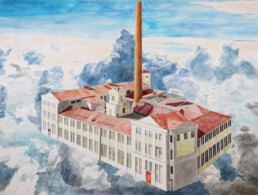
Nina Ivanović, Jugošped, 2021, akvarel na papiru, 200 x 150 cm
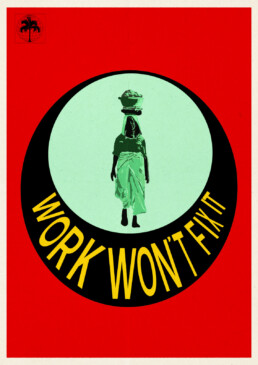
Kiluanji Kia Henda “Work wont fix it” poster
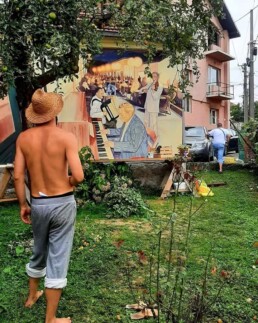
Karavan, Photo: Tijana Maric
Members of the Board of the October Salon:
Vuk Vidor, President
Gordana Goncic
Zorana Djakovic Minniti
Danica Jovovic Prodanovic
Mihael Milunovic
Founder and patron: City of Belgrade
Organized by the Cultural Center of Belgrade
Supported by the Ministry of Culture of the Republic of Serbia
Partners:
Museum of African Art
Museum of the City of Belgrade
Faculty of Fine Arts
Gallery of the Association of Fine Artists of Serbia (ULUS)
Gallery of the Union of Fine Artists of Yugoslavia (SULUJ)
Liceulice
La Biennale de Lyon
Museum of Contemporary Art, Lyon
Chelsea College of Art, University of the Arts, London
Museum of Modern Art, Bologna
Supported by:
Italian Council
British Council
Danish Arts Foundation
French Institute, Serbia
Italian Cultural Institute in Belgrade
Austrian Cultural Forum
La Boîte
Program support:
Hestia
Infomedia Group
Cvece zla
